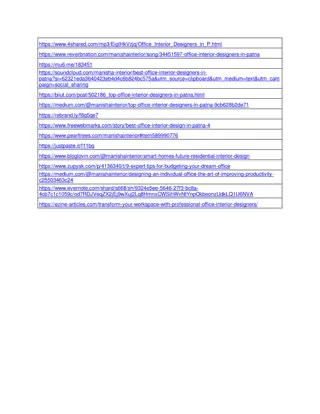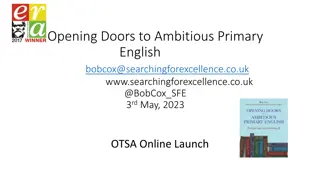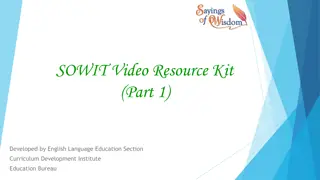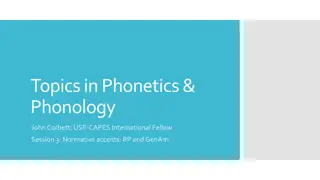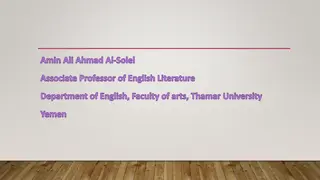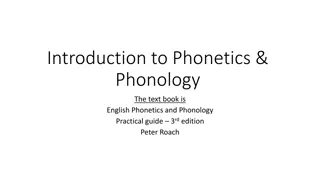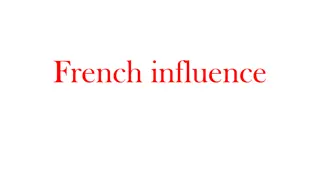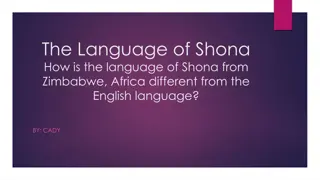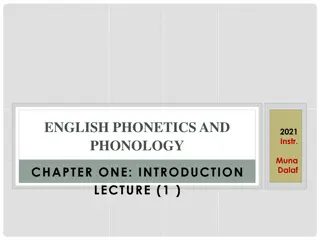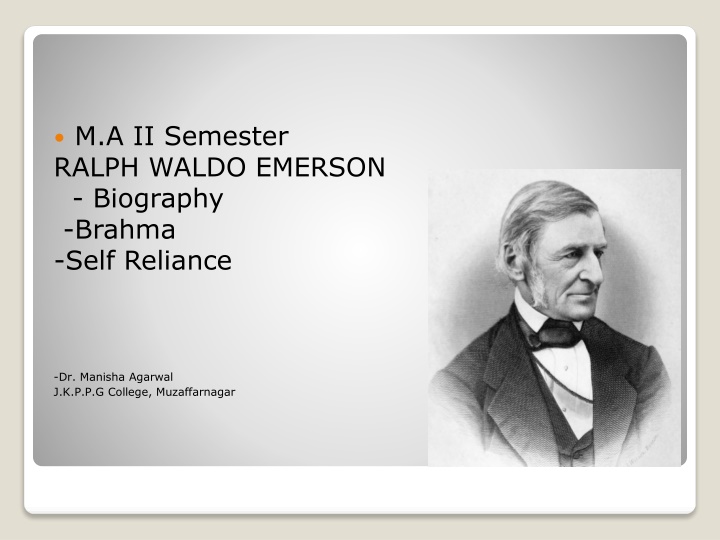
Ralph Waldo Emerson - Biography, Brahma, Self-Reliance
Explore the life of Ralph Waldo Emerson, a renowned essayist and poet, from his upbringing in a family of ministers to his influential works like Brahma and Self-Reliance. Discover his journey of questioning faith, embracing transcendentalism, and advocating for self-reliance.
Download Presentation

Please find below an Image/Link to download the presentation.
The content on the website is provided AS IS for your information and personal use only. It may not be sold, licensed, or shared on other websites without obtaining consent from the author. If you encounter any issues during the download, it is possible that the publisher has removed the file from their server.
You are allowed to download the files provided on this website for personal or commercial use, subject to the condition that they are used lawfully. All files are the property of their respective owners.
The content on the website is provided AS IS for your information and personal use only. It may not be sold, licensed, or shared on other websites without obtaining consent from the author.
E N D
Presentation Transcript
M.A II Semester RALPH WALDO EMERSON - Biography -Brahma -Self Reliance -Dr. Manisha Agarwal J.K.P.P.G College, Muzaffarnagar
Born on may 25,1803 in Boston, Massachussets into a family of ministers that prized education, learning and culture, Ralph Waldo Emerson grew up to be a famous essayist and poet. Sadly his father died when he was eight, the first of many deaths that made him question his faith. His aunty Mary Moody helped educate him. She then became the dominant influencer in his life. She was the first to introduce Emerson to Hindu scriptures and Neoplantonism. She was open to natural religion and welcomed the transcendetalism sensibility.
At age 14, Emerson was sent to Harvard Divinity school to study. He become a pastor in order to carry on the Emerson name in the church. In 1830 he became full minister of second church. Though keeping the title Reverend for many years, Emerson left the pulpit in 1832, and began his travels.
In 1833, Emerson began a new career as a lecturer. He made Concord his home and lived there for the rest of his life, leaving it only for lectures. Emerson did not like the term Transcendentalism , preferring idealism . He once said that Transcendentalism was simply a protest against formalism and dogmatism in religion, not a philosophical but a spiritual movement looking towards a spiritual faith.
In 1835 he married Lydia Jackson. Lydia took keen interest in his ideas and his work. They had four children but their first, Waldo, died in 1842 at the age of five. Their other children were Ellen, Edith and Edward Waldo. He said in an 1854 address on anti-slavery, self reliance, the height and perfection of man, is self-reliance on God. He preached the god within, not the god of authority and tradition. He many times indicated that we know god first and mainly through moral law within. He said It is by following other men s opinions that we are mislead and deprived.
Emersons health began to fail in 1871, at age 68. He continued to lecture, sometimes from his chair, until two years before his death. He died in his sleep, aged 79, on April 27,1882
Brahma BY RALPH WALDO EMERSON If the red slayer think he slays, Or if the slain think he is slain, They know not well the subtle ways I keep, and pass, and turn again. Far or forgot to me is near; Shadow and sunlight are the same; The vanished gods to me appear; And one to me are shame and fame. They reckon ill who leave me out; When me they fly, I am the wings; I am the doubter and the doubt, I am the hymn the Brahmin sings. The strong gods pine for my abode, And pine in vain the sacred Seven; But thou, meek lover of the good! Find me, and turn thy back on heaven.
This is a Lyric poem in which the poet assumes the form of Hindu God Brahma. It has 4 stanzas with four lines in each stanza with rhyme scheme ABAB. The poem is poetic extension of American romanticism known as transcendentalism. According to this philosophy, we all of us are the product of the same one-soul. We should learn to rely on ourselves. Therefore, self- reliance is an important aspect of American transcendentalism. Brahma represents the eternal, infinite soul of universe where every individual soul gets united.
It is named after Brahma, the Hindu god of creation. Brahma is one of the gods in the trinity (consisting of Brahma, Vishnu and Mahesh). Brahma presents a faithful version of the ideology of the Hindu epic Bhagawad Gita that the soul is immortal.
Brahma presents himself as the centre of the universe. He is timeless, immortal and permanent. He symbolizes the creation of the human soul. A person may be killed physically, but his soul is not killed. It passes from one person to another and thus, is eternal and immortal. Nothing is secret to Him. Shadow and sunlight are the same for Him. He treats shame and fame at same level. He vanquished gods also appear to Him. He resides in Heaven. He can t be doubted because he Himself is doubter and doubt. A slayer and the slain are also the result of the same spirit. If anything is for or forgotten, that thing is very close to Brahma.
If anyone sings, Brahma is the music. If anyone flies, Brahma is the wing. Brahma is also aware that human beings are competing to get Him. But Brahma suggests mankind to develop goodness and reach close to Him. Brahma, the speaker, concludes the poem with a suggestion that if people find their way to Brahma s essences, they will have all that they need for all eternity.
Self-Reliance Ralph Waldo Emerson wrote the essay Self-Reliance and published in 1841 as part of his first volume of collected essays. In self-reliance , Emerson argues that polite society has an adverse effect on one s personal growth. Self-sufficiency, he writes, gives one the freedom to discover one s true self and attain true independence. Self-Reliance means Self-dependence.
Key points of Self-reliance A genius is one who speaks not what he is taught, but what he is convinced is right and proper. He speaks out his own thoughts and not what he has learned from others, in other words, self-reliance is the hall mark of genius. Truth thyself . Every heart must accept the place God has allotted to him. A self-reliant man does not conform to anybody, rather he makes others to conform to him. A man should carry himself in the presence of all oppositions, as if everything except himself were unimportant and transient. He must speak only the truth.
A man's life should be for itself and not be intended as a spectacle. He must not pose and make a show of his charitable nature. What a man must do is all that concerns him. It does not matter what other people think of his actions. Emerson is against conformity to old traditions, customs and usages for such adherence to the past, scatter one's energy, It wastes a man's time and blurs the impression of his character. There is no great sin in contradicting oneself, for your views and opinions may change with the passage of time. We should not bring the past for judgment on our present actions and present talk. A man is not judged by single but by all that he has said and done in the course of his life. Virtue which is loved and respected is always ancient. The Reformation for instance, was the result of the initiative of one man Martin Luther.
The over-soul is the first source of all life and all actions. It is this over-soul which unites and harmonises the diverse. Self-reliance means freedom from slavery both from the past and the future. Most people are like children who repeat the sentences of their grandmothers and tutors and as they grow older, repeat the sentences that they happen to read of in certain books. When a man lives with God, his voice be as sweet as the murmur of the brook and the rustle of the corn. Remember, power comes with the excercise of self-trust. A man should be self-reliant in religion and prayer, in education, in matters pertaining to culture-art and literature--and in reference to property. A man should insist on himself and never imitate.
If a man is at one with God, he will not beg for anything but will see prayer in all actions. "The prayer of the farmer kneeling in his field to weed it, the prayer of the rower kneeling with the stroke of his oar, are true prayers heard throughout nature." Americans are fond of visiting Italy, Greece, England, Egypt and other countries in search of culture and refinement. There can be no objection to travelling over the world for purpose of art, of study, and of benevolence. But he who travels for amusement, travels away from himself. Travelling is a fool's paradise. Dependence on others must cease. Every man is unique and only his Maker can teach him. He must learn from the over-soul, and from none else.
The civilized man has built a coach but has lost the use of his feet. He wears a beautiful watch on his wrist but he has lost the skill to tell the time by the position of the sun. A man can become strong and self-reliant only when he rejects all outside support and stands alone. A political victory, an increase in the number of friends or some other favourable event, raise your spirits and we think that good days are coming for us. Nothing can bring peace to us except reliance on ourselves. Nothing can bring us peace except the triumph of principles.
Emerson was an individualist, and his Self-Reliance is an extreme statement of the individualist point of view. He thought of society as composed of individuals. A good society would be a society composed of good individuals. Self-Reliance" in short is a manifesto both of Emerson's Transcendentalism and Individualism. It also expresses his views on history, on prayer, on education, on travel, on property, on conformity and consistency, and a number of other subjects. Transcendentalism implies faith in the over-soul. The over-soul means the ultimate reality from which all life is derived and by which the universe is unified. Self-reliance means freedom both from the past and future.
Obedience to the over-soul means rising above all intermediary institutions like society, social institutions and customs. Emerson thus argues that if people rely on moral guidance from above then society can be "maintained without artificial restraints. John Jay Chapman said that Emerson represented a protest against the tyranny of democracy. He expresses a form of belief in the importance of the individual which is independent of any personal relations with the world.
It is the doctrine expressed in the words, "Trust thyself. The greatest obstacles in the way of self-reliance are the requirements of social conformity and intellectual consistency. One must act according to the light within him and not care for what others have said and done. Great men have always been men of character, who have acted according to their own convictions and such conviction has given fire, eloquence and effectiveness, to their words. Self-reliance is self-existence. A self-reliant man is self-sufficient, the over-soul is his only guide and mentor. He says and does what the 'over-soul' prompts him to say or do. That is why he expresses different views on different occasions.
It shows that the self-reliant man is fearless, he follows his own intuition and is not afraid of contradicting himself. A self-reliant man is, in short, both non-conformist and inconstant. Nothing is sacred but the integrity of your own mind." He wants man to be mentally free. "Nothing can bring you peace but yourself. Nothing can bring you peace but the triumph of principles." This is the central creed of Emerson and he kept stressing it all through his career. "Once a man cultivates self-reliance, he can achieve great things in all walks of life. The real prayer is of the farmers, of the humble workers, who do their duty even against heavy odds.




